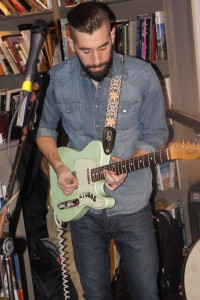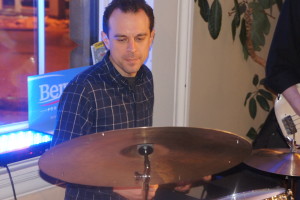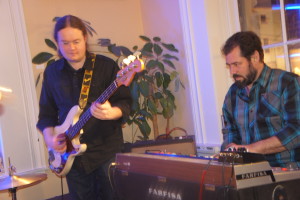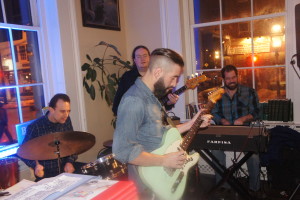
Matt Stubbs
Acting on a tip from greater-Boston’s blues maven Al Cecchinelli, I caught Matt Stubbs and The Antiguas at the Book And Bar in Portsmouth, New Hampshire. The band played their special brand of instrumental rock, blues, and surf music to a fairly sizable and enthusiastic crowd last Saturday night. Their music found a good home in this venue which combines a used book store with a coffee shop and bar. The room’s wide open space and high ceiling let the sound breathe and travel.
The band opened with “Time Is Tight,” and it’s breezy organ groove set the pace for the guitar-bass-and drums to build an edge on top. Tight ensemble work resulted in a flowing, three-dimensional sound. Ken Clark’s Farfisa organ work was engaging while Stubbs picked off some succinct notes with beautiful and flinty tones.
Segueing into a whole different vibe for “El Segundo,” drummer Chris Rivelli conjured a more primitive vibe, using mallets to play down tempo fills. Stubbs unfurled some tasty licks with his six string as Clark’s moody organ swirls seem to come from a far off land, their presence growing more prominent as he went along, creating a haunting build up. All of these elements came together to create the effect of taking the listener off to a far away land.
Turning a corner into a sharp, oldies style rock and roll take on Ray Charles’ “One Mint Julep,” the quartet pumped out something akin to surf, especially as Clark’s Farfisa laid out a rich melodic line. Stubbs soon chimed in with an icy cool melodic line of his own, music you can feel as well as hear, since it had such distinct colors, tones.
Their fourth number, cleverly titled “Dub Stubbs,” bopped along with a purposeful stride. Locked into a tight groove, the four played something that would’ve made you tap your toes while wild organ flights of fancy would have expanded your mind. It was better than the best hallucinogenic I ever experimented with when I was a kid.
Stubbs went to town with some feisty licks on a rock instrumental called “Deuces Wild” before playing original “ Dancing With The Bull .” A down tempo charmer, it found the boys gently pushing out notes as delicate as infancy, sweet as chocolate. Rivelli did some handy stick work, playing his bongos and his drum set simultaneously. Over his beats, the other three tapped out emotive, seductive organ, small bumps of low end notes, brittle, tuneful phrasing. It was like ear candy and a candy store with plenty to offer.

Chris Rivelli
Freewheeling melody and a sprightly groove marked the seventh number. Stubbs and Clark took turns with the melodic line. Clark got into a jazz tempo before Rivelli played a solo filled with vigor, an intricate pattern that had all eyes and ears glued.
On “Pistol Whipped,” the boys stomped out a thicker sound, one that pounded with the force of their fine ensemble playing. They soon slammed out another rocker, a piece with plenty of organ grit and solid, speedy guitar-bass-drums around the craziness emanating from the keys. One couldn’t help but get caught up in the band involving leads and rhythms.
A cover of Junior Wells’ “Snatch It Back And Hold It” featured the boys plays numerous rivulets of notes, notes which raced along to turn this old number into a pulsating work. A fuzzy bass solo from Marc Hickox rocked it even more. That rumbling bass had a tone that melded perfectly with the song’s tempo to create something exciting and motivational.
Wavy guitar lines gave character to the number “Can You Dig It?” Stubbs inspired the band with his phrasing and the other three followed suit with their own sparks of creativity. “Mango” was a down tempo breezer, conjuring an image of island easeful, peaceful vibes. Showing their control of dynamics, the boys soon turned this into a heavier feeling, showing their flare for setting moods.
An older original, “Sticky Bunz,” was marked by a Bo Diddley beat as well as the boys showing individually what they are made of. A peppy Rivelli drum solo followed by a rumbling Hickox bass solo with plenty of knobby notes showed that these two players are not sidemen but rather cornerstones of this band.

Marc Hickox, Ken Clark
Something the band played in the key of D felt like an old classic rock number. The quartet carried the listener through its changes with gentlemanly aplomb.
Soon into a high pitched guitar phrase driven piece called “Hot N Heavy White,” the other three put flinty organ and a thumpy groove around the Stubbs workout. This all made for a song with muscular authority. Stubbs paid out some fiery guitar lines but also had the tasteful self-restraint to pull it back and let his band mates strut.
“Sleep Eyes” was a down tempo blues that pulled people onto the dance floor, even though this was more of a listening room crowd. Next up, the band’s take on Bill Doggett’s “Big Boy” made room for pulpy grooves as well as Stubbs’ biting guitar riffs. How Stubbs can play those riffs so fast while keeping his delicious tone on the level of artfulness I’ll never know.
Stubbs made his guitar bark out his chords on “Hot N Heavy” before turning it into a higher pitched melodic cry, sounding like what a song bird would sound like if a song bird had amplification.
Fuzzy bass lines, sensuous guitar notes, an organ swirl, and snazzy drum work made closing number “Del Diablo” come to three dimensional life. Feeling and sounding similar to Pink Floyd playing at a wild party, a bit eccentric, a bit tuneful, each player unfurled something special to keep this sound intact and afloat. It was like a kaleidoscope for the ears.

Matt Stubbs and The Antiguas
It was a great night last Saturday at the Book And Bar, Portsmouth’s unique combo of used book store, coffee shop, bar, and music venue. Not only did I enjoy their particularly good coffee and food while I was there, I also purchased a couple of books, Norman Mailer’s The Gospel According To The Son and Virginia Woolf’s A Room Of One’s Own. (Yes, I was a lit major.)
Stubbs and The Antiguas are now playing a Monday night residency at the Plough & Star in Cambridge. Vintage films and psychedelic images will be projected onto a large screen with an old movie projector. Free of charge, no cover.
Editor’s note: Good call, Cecchinelli.

